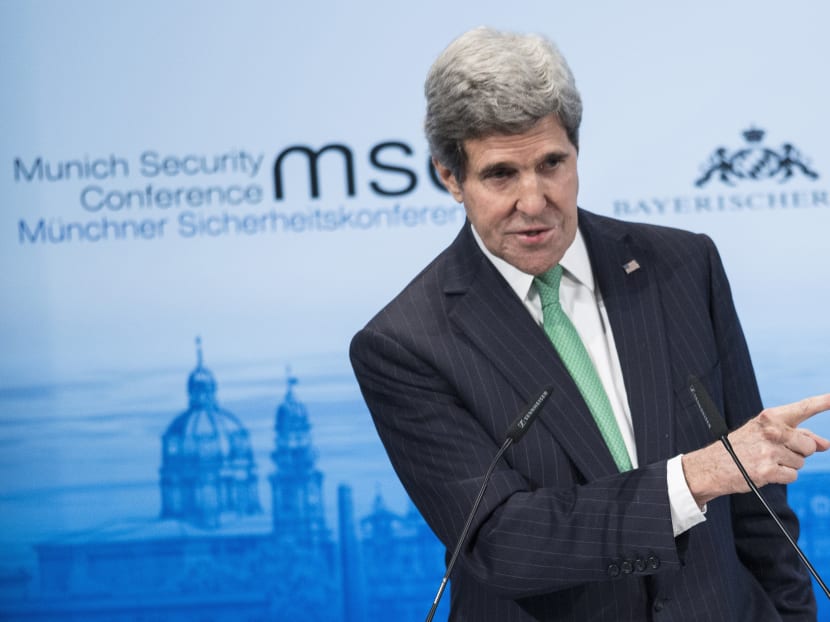Israeli minister slams Kerry’s boycott warning
JERUSALEM – Israel’s economics minister lashed out at United States Secretary of State John Kerry today (Feb 2) for warning against a growing boycott movement against the Jewish state should peace talks with the Palestinians fail.

US Secretary of State John Kerry speaks during the Munich Security Conference at the Bayerischer Hof Hotel, Feb 1, 2014 in Munich, southern Germany. Photo: AP
JERUSALEM – Israel’s economics minister lashed out at United States Secretary of State John Kerry today (Feb 2) for warning against a growing boycott movement against the Jewish state should peace talks with the Palestinians fail.
Mr Naftali Bennett, from the religious, pro-settler Jewish Home party, has been a fierce critic of the Kerry-led talks and a persistent gadfly to Prime Minister Benjamin Netanyahu, who is negotiating against a backdrop of increasing international pressure to reach a deal coupled with a growing call for boycotting Israel.
A small but growing number of European businesses and pension funds have begun to drop investments or limit trade with Israeli firms involved in West Bank settlements. At a security conference in Germany this weekend, Mr Kerry warned that a breakdown in Israeli-Palestinian talks would accelerate this trend.
“Today’s status quo absolutely, to a certainty, I promise you 100 per cent, cannot be maintained. It’s not sustainable. It’s illusionary. There’s a momentary prosperity, there’s a momentary peace,” Mr Kerry said.
Mr Bennett said all “the advice givers” should know that Israel will not abandon its land because of economic threats.
“We expect our friends around the world to stand beside us, against anti-Semitic boycott efforts targeting Israel, and not for them to be their amplifier,” he said, in a clear barb. “Only security will bring economic stability, not a terrorist state next to Ben-Gurion Airport.”
Ms Tzipi Livni, Israel’s chief negotiator, came to Mr Kerry’s defence, saying he was merely expressing concern for Israel’s future.
Over the past six months, Mr Kerry has held endless back-and-forth talks with Israeli and Palestinian leaders in hopes of reaching a framework for a peace agreement. He is expected to present his ideas in the coming weeks and both sides have balked at some of his expected proposals.
Israeli nationalist leaders like Mr Bennett, for instance, oppose a Palestinian state that is based on the pre-1967 borders. More than 500,000 settlers live in the West Bank and east Jerusalem, territories Israel captured in the 1967 war and which the Palestinians now hope will be part of their future state. Known to religious Jews as Judea and Samaria, they are parts of the biblical land of Israel and hard-liners object to ceding either area on both spiritual and security grounds. Any expected peace accord would put the fate of dozens of settlements at risk.
But European officials have warned that Israel could face deepening economic isolation if it presses forward with the construction of more settlements. In the latest example, Denmark’s largest bank, Danske Bank, blacklisted Israel’s Bank Hapoalim because of its links to settlement construction.
Once dismissed as a fringe issue, the boycott threat is now increasingly taking centre stage in Israeli public debate.
Israeli Finance Minister Yair Lapid recently said that even in the case of a limited boycott that reduces Israeli exports to the European Union by 20 per cent, the damage would amount to about 20 billion shekels (S$7.26 billion) in exports annually.
In a related development, Mr Lapid also ordered that all payments to settlements be stopped until their use is clarified. The move followed a TV report that said funds were allegedly being illegally transferred to the Yesha Council – an umbrella groups of settlers – that was illicitly using the money for political purposes. AP






